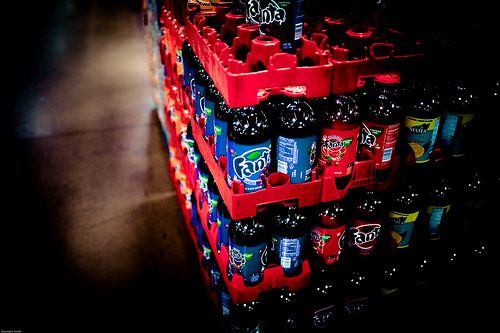Sugary Drinks Tax Would Reduce Obesity, Create Healthier Youth As ‘Effective Public Health Measure’

Taxing all sugary drinks, from flavored water to apple juice, from diet soda to lemonade, at a rate of 20 percent would reduce the overall prevalence of obesity and promote healthier lifestyles in the youth, claims a recent study published in the British Medical Journal.
U.K. researchers estimate that a 20 percent tax on sugary drinks would reduce overall obesity rates by 1.3 percent, or some 180,000 people, although opponents argue the tax is too simplistic and doesn’t cut to the heart of the obesity epidemic. Similar to arguments against the proposed ban on sugary drinks in New York City, dissenters of the sugar tax claim people will simply find their sugar elsewhere, or choose to add it to drinks themselves.
"Sugar-sweetened drinks are known to be bad for health and our research indicates that a 20% tax could result in a meaningful reduction in the number of obese adults in the U.K.,” Dr. Adam Briggs, lead study author and researcher at the Nuffield Department of Population Health at Oxford University, told the BBC. "Such a tax is not going to solve obesity by itself, but we have shown it could be an effective public health measure and should be considered alongside other measures to tackle obesity in the U.K."
The problems of obesity in the U.K. aren’t so dissimilar from those in the U.S. In both countries, adults and children alike are experiencing a widening of waistlines and a decline in physical health. Roughly 40 percent of British males are overweight, and 20 percent are obese. Obesity rates in the U.K. are the highest in Europe, according to University of Birmingham statistics. Likewise, more than a third of all American adults are obese (35.7 percent), with estimated annual medical costs ballooning, in 2008, to $147 billion.
A study earlier this year found pediatric hospital admission rates quadrupled in the last decade for obesity-related diseases in the United Kingdom.
For some, however, the obesity epidemic isn’t one spurred on entirely by sugar. Gavin Partington, director general of the British Soft Drinks Association, argued that "trying to blame one set of products is misguided, particularly when they comprise a mere 2% of calories in the average diet."
A 20 percent tax would raise the average price of a 330mL (roughly 11 oz) soft drink by about 12 pence, or 19 cents. A two-liter soda would rise in cost by about 64 cents. Effectively, the rise in cost sits at the heart of the controversy. Whether U.K. citizens are comfortable paying more for their sugary and fizzy drinks is a point of contention, as some argue the added cost will steer people towards other sugary options or it will simply make a cheap drink slightly more expensive.
"Most nutritionists agree it would be better to drink water than sugar-sweetened beverages,” Tom Sanders, professor of nutrition and dietetics at King's College London told the BBC. “However, many consumers like sweet drinks and if they could not afford to buy sugary fizzy drinks they can always revert to drinking tea with added sugar as in the past.”
However, "the cost of sugar-sweetened beverages is currently so low that any price increase would be so marginal that it would be unlikely to affect intake,” he added.
While the research team used sophisticated econometric models to predict how sugary drink taxes would affect obesity, when it comes to what people put in their bodies, experts have long observed they can be predictably irrational. One poignant example is social interactions — events that, in theory, require only one person purchase drinks. Another is an increased consumption of sugary foods, which the researchers avoid addressing in their report. While drink substitutes for sugary drinks are limited, a person who switches from soda to water may still crave sugar, leading the person to indulge in more sugary snacks.
Malcolm Clark, coordinator of the Children’s Food Campaign at the farming charity Sustain, argues the tax would have a larger symbolic effect that eclipses petty debates over saving pennies.
"We challenge the government to show it has a public health backbone by introducing a sugary drinks duty,” he told the BBC, “alongside better protection for children from junk food marketing and robust nutrition and sustainability standards for all the food served in schools, hospitals and other publicly funded places."
Source: Briggs A, Mytton O, Kehlbacher A. Overall and income specific effect on prevalence of overweight and obesity of 20% sugar sweetened drink tax in UK: econometric and comparative risk assessment modelling study. BMJ. 2013.



























